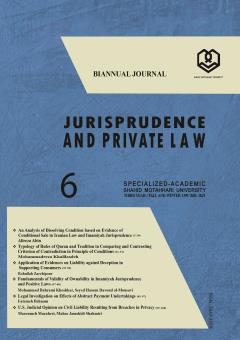-
-
-
Open Access Article
1 - A Comparative Study of Undue Influence in British Law and Principle of Duress and Compulsion in Iranian Law
Mohsen Esmaili Kazem Shah’baniAbstract: In British law, equity courts have created and expanded the principle of “undue influence” due to restrictions with principle of duress to compensate damages imposed on the victims. This legal institution is legally applied in the case of a person who had been MoreAbstract: In British law, equity courts have created and expanded the principle of “undue influence” due to restrictions with principle of duress to compensate damages imposed on the victims. This legal institution is legally applied in the case of a person who had been under the influence of a third party, his parents for instance, when signing a contract. Therefore he/she is not legally committed to the terms of the contract he has signed. Enforcement of undue influence is one reason for unfairness of the contract and legally sufficient to terminate it. The principle of duress and compulsion in Islamic jurisprudence supports the will of weak and under-influence individuals to some extent. Duress in case of threat and lack of satisfaction will render the contract null and void. Compulsion, in its totality, has no effect on the contract and it only removes penal liability. Only misuse of compulsion and emergency contracts signed under duress (i.e. in cases compulsion has been practiced intentionally by the other party) are similar to the undue influence, neither of which has received outright support by the legislators. After a comparative study of these two legal institutions in Iran and the UK, this paper came to the conclusion that there is a need to reform the principle of duress and compulsion in our legal system. Manuscript profile
List of Articles Mohsen Esmaili
-
The rights to this website are owned by the Raimag Press Management System.
Copyright © 2017-2024


